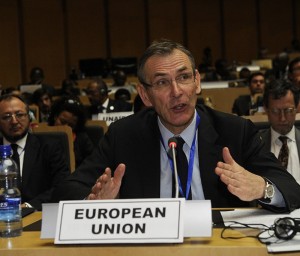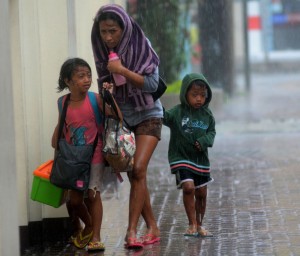MANILA, Philippines—The European Commissioner for Development will visit the Philippines on Sunday to strengthen bilateral development cooperation between the European Union and the Philippines.
European Union (EU) commissioner Andris Piebalgs said the highlight of his visit is the support to the Philippines “on its path to reduce poverty, strengthen the rule of law and support Mindanao’s Peace Process.”
Aligned with the Philippines Development Plan for 2011 until 2016, EU development assistance delivers annually to the country about €640 million of grants “to combat poverty.”
Piebalgs will meet Presidential Adviser on the Peace Process Teresita, Quintos Deles, Socio-economic Planning Secretary Arsenio Balicasan, Energy Secretary Carlos Jericho Petilla and Department of Foreign Affairs Undersecretary Evan Garcia.
Ahead of the visit, Commissioner Piebalgs said in a statement: “I am pleased to see rapid economic growth in the Philippines in past few years. However it is now important to deepen the economic reforms and make this growth more inclusive.”
As part of Piebalgs’ itinerary, he will visit the Bureau of Fisheries and Aquatic Resources of the Department of Agriculture, which is supported by the EU Trade Related Technical Assistance (TRTA) project.
Aside from the EU development assistance budget, the EU TRTA, in a 12-year period, has granted €18 million aimed at improving laboratory facilities in the Philippines, enhance the control system for fisheries products, training of Fish Health Management and Quality Assurance on export requirements to the EU, among others.
The agenda of the commissioner’s visit also includes a meeting with the president of the Asian Development Bank to discuss how to enhance collaboration between the EU and the Bank in Asia, Central Asia and the Pacific.
According to the statement of EU, the bilateral EU-Philippines program is complemented by additional funding channelled through civil society organizations to address specific priority issues such as social issues, the environment, attention to indigenous peoples, human rights and migration.
There are 30 EU-funded projects being implemented by members of the civil society.
The EU is working jointly with the Department of Health to address particularly maternal health and access to health services for indigenous people. Other programs support directly the Good Governance Agenda of President Aquino, Trade Integration and Job Creation and a particular emphasis is put on conflict-affected Mindanao.



